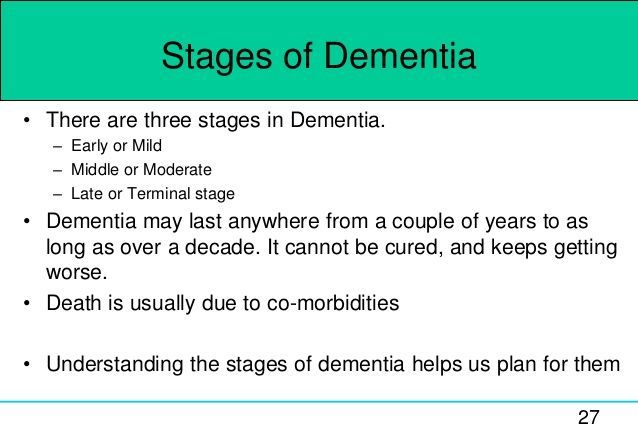The Three Stages of Dementia

Nobody knows what will happen when your older adult’s cognitive ability, or behavior changes. There is so much uncertainty with this Alzheimer’s and dementia, but understanding the three stages of dementia may give you a sense of what you can expect.
The three stages of dementia relate to Alzheimer’s as well and please remember, that not everyone will fit into a stage or progress as stated because each person’s journey is different.
The first stage is early or mild dementia – during this stage, the person may still be able to live by him/herself and be able to drive, work and socialize. They may start forgetting familiar things and others can “seem off.”
Symptoms of early/mild dementia may include:
Struggling to find the right words, or struggling to remember names or people you know.
Losing or misplacing things more often.
Forgetting something you just read.
Having trouble planning or organizing things.
Having difficulty doing everyday tasks.
Making poor decisions.
The second stage is middle/moderate dementia – this stage is usually the longest and can last for several years. During this stage, the person may get their words mixed up, get frustrated or angry easily, or act in unusual ways, like refusing to bathe for days. People in this stage may need in-home care or assisted living.
Symptoms in middle/moderate dementia may include:
Forgetting major life events or things that recently happened.
Being confused about where they are or what day it is.
Forgetting their address, phone number, or other significant things.
Being moody or withdrawn.
Changes in sleep pattern.
A handful of people in this stage experience incontinence.
Wandering and getting lost.
Needing assistance in choosing clothes.
Personality and behavior changes.
The third stage is late-stage dementia. In this stage, people increasingly lose the ability to engage in the world, hold a conversation and control their muscles.
They have difficulty communicating and expressing thoughts, even though they may still be able to speak.
Their memory and cognitive skills will continue to worsen, and you may see personality changes.
People at late-stage dementia will usually:
Progressively lose physical abilities, including the ability to sit, walk, and swallow.
Need 24/7 help with daily activities and personal care.
Lose awareness of recent experiences and their surroundings.
Have an increase of difficulty in communicating.
Become more likely to develop infections, especially pneumonia.
Dementia affects each person differently and changes different parts of the brain at different points in the progression of the disease. A person with dementia does not always fit into one stage and different types of dementia sometimes have different symptoms.
Knowing the stages can help you plan, and planning is essential. Having an idea of the symptoms gives you the tools you need to find ways to cope with the behaviors your older adult will experience, and it gives you the chance to prepare for it all mentally.
I hope learning about the three stages of dementia helps you better prepare for the journey you and your loved one will be embarking upon. If you are a caregiver and need guidance, we hold four (4) Alzheimer’s caregiver support groups a month and they are all free. Give us a call at 386-847-2322 for more information, do NOT go this alone!!!




